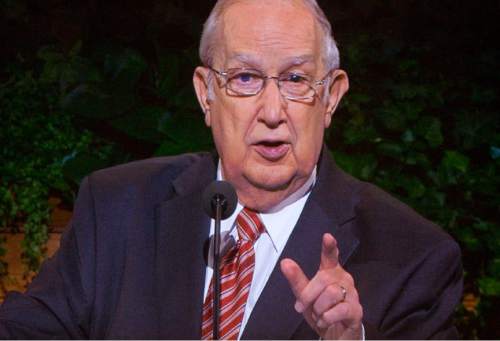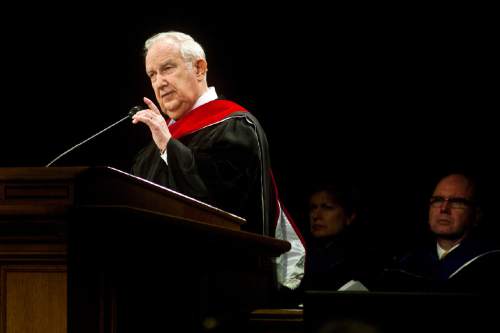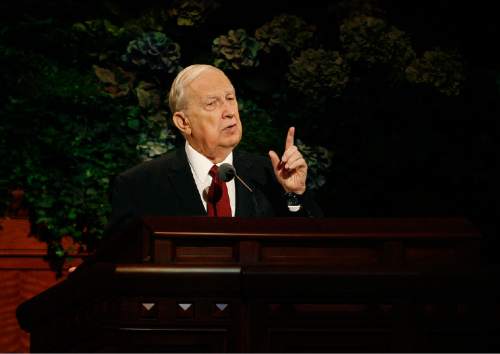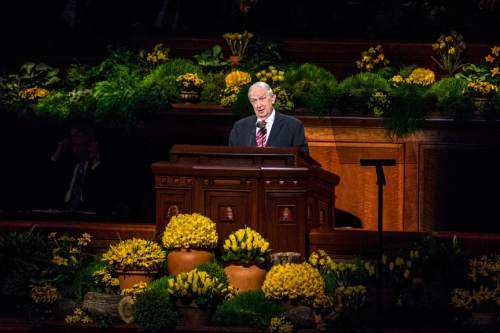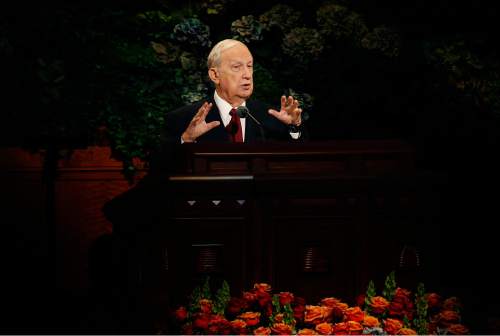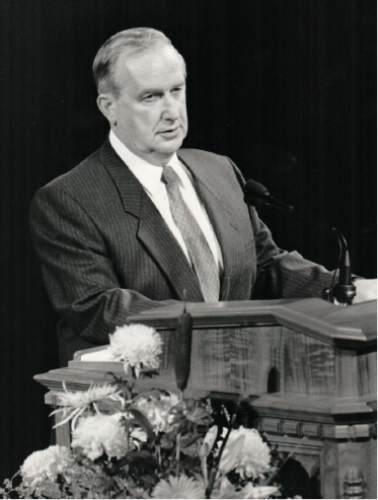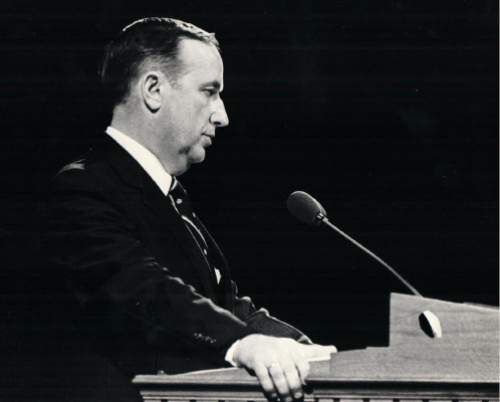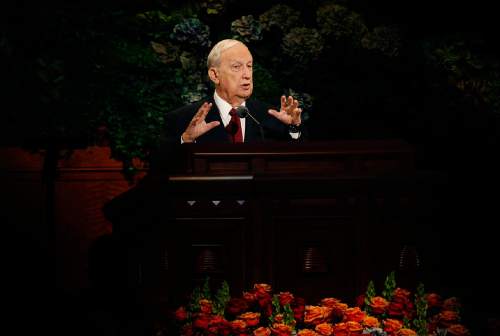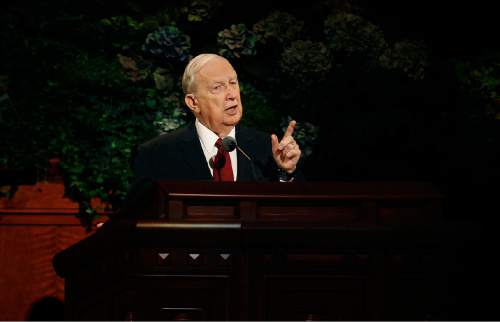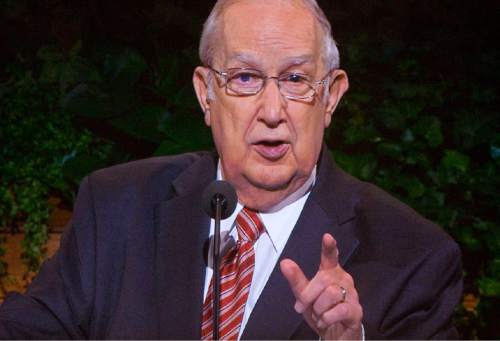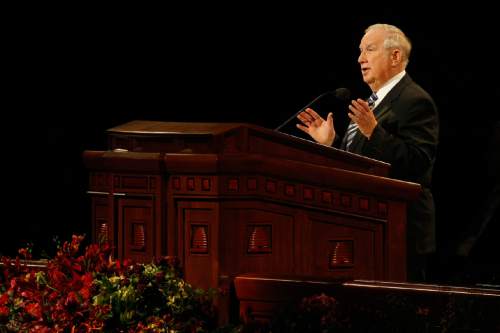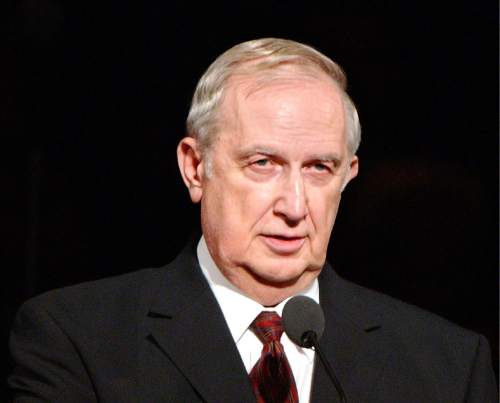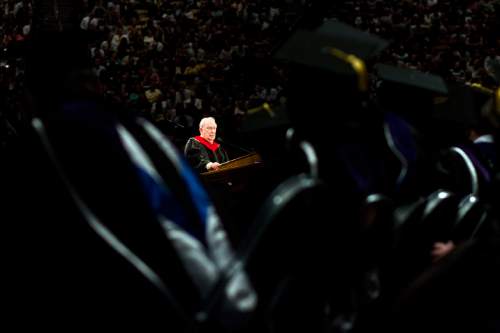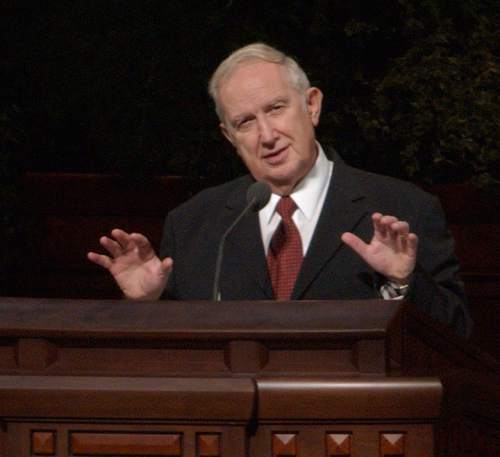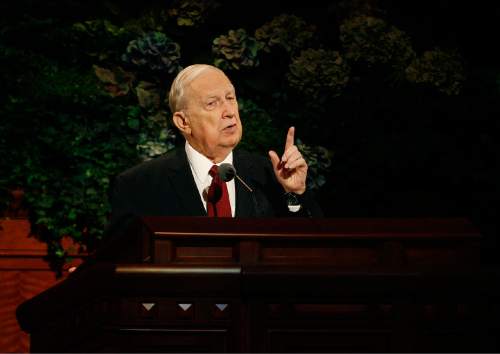This is an archived article that was published on sltrib.com in 2015, and information in the article may be outdated. It is provided only for personal research purposes and may not be reprinted.
Mormon apostle Richard G. Scott, who had a mind for science and a heart for service, died Tuesday afternoon in his Salt Lake City home from causes incident to age.
He was 86 years old.
Scott's passing, surrounded by family, leaves three vacancies in the LDS Church's Quorum of the Twelve Apostles after the deaths earlier this year of L. Tom Perry and Boyd K. Packer — a leadership void not experienced in Mormonism in more than a century.
The Church of Jesus Christ of Latter-day Saints will convene for General Conference, beginning this Saturday, and continuing Oct. 3 and 4. Most members expect their leaders to name two new apostles during the fall gathering, though the Utah-based faith said Tuesday it was "undetermined when the [Scott] vacancy ... will be filled."
An apostle for 27 years, Scott was ordained Oct. 6, 1988, at age 59 to the quorum, a group of men, along with the three-member governing First Presidency, revered as "prophets, seers and revelators" by the world's 15 million-plus Mormons.
"Elder Scott was able, very successfully, to keep his eye on eternity," fellow apostle D. Todd Christofferson, who earlier served as a young missionary under Scott, said in a news release. "His messages were filled with hope. And he was unapologetic about repentance and the atonement because he knew that that's where hope came from or what one could hope for as a consequence of true, full repentance and the effect of the atonement, the grace of Jesus Christ, in one's life."
Funeral arrangements have yet to be announced.
Balancing science and faith • Scott was born Nov. 7, 1928, in Pocatello, Idaho. According to a profile on LDS.org, he was interested in science from a young age, and his parents, Kenneth Leroy Scott and Mary Eliza Whittle Scott, encouraged him and his brothers to build and repair machines to discover how they worked.
Scott was reared in Washington, D.C., where his dad worked as assistant secretary of agriculture under U.S. Secretary of Agriculture Ezra Taft Benson, an LDS Church apostle at the time. Benson, who later became president of the faith, called Scott, then age 59, to the apostleship in 1988.
"The example of President Benson — his integrity, his devotion, his great ability to defend principle — very deeply touched my father," Scott told the church's Ensign magazine for a 1988 profile.
Scott attended George Washington University, where he studied mechanical engineering and played in a jazz band. While a student, he met — and later married in the Manti LDS Temple — Jeanene Watkins, daughter of U.S. Sen. Arthur Watkins of Utah.
Scott often credited the insistence of his wife that she would marry only a returned Mormon missionary in an LDS temple with placing him on a path of church service. He reportedly had not considered serving a mission when they first met. But, with her encouragement, he completed a mission in Uruguay, during which he immersed himself in the teachings of the faith's signature scripture, the Book of Mormon.
In an address during the church's April 2011 General Conference, Scott spoke about his family and said young men of appropriate age should not waste time in idle pursuits but should "get on with life and focus on getting married."
"I have no power to describe," he said, "the peace and serenity that come from the assurance that as I continue to live worthily, I will be able to be with my beloved Jeanene and our children forever."
A nuclear engineer, Scott served on the immediate staff of Adm. Hyman Rickover from 1953 to 1965, contributing to the design of the nuclear reactor for the U.S. Navy's first nuclear-powered submarine, the USS Nautilus, and helping with the development of the first commercial nuclear power plant, according to the profile at lds.org.
Love for Latin America • Scott returned to South America in 1965 to preside over a Mormon mission in Argentina.
"He was mission president at a time when Argentina began to refuse to allow missionaries in the country," recalled Bob Fletcher, one of his missionaries. "He was the church point man to resolve the situation."
Years later, Fletcher bumped into Scott again while visiting Bogota, Colombia.
"I arrived at the hotel, checked in, and went across the street to a burger place, where, much to my surprise, I found Elder Scott having supper with two other men, all three dressed in suits," Fletcher wrote in an email. "I was tempted to go over and say hello, but hesitant because they were deep in conversation. Amazingly, Elder Scott recognized me and called me by name, 'Well, Elder Fletcher,' I don't think he knew my first name."
Turns out, the hotel had lost the three men's reservations, and they had been unable to find other accommodations. Fletcher offered Scott his room, and Fletcher would go stay with friends while the other two men bunked with LDS leaders in the area.
"We finished our dinner, went back to the hotel, where I was on a first-name basis with the manager, and proposed the swap," said Fletcher, who now lives in New Hampshire. "He was reluctant to do it, not because he didn't want to help but because he didn't want me to go elsewhere."
The manager finally conceded that there was a vacant room: the presidential suite, with three bedrooms. Problem solved.
"The next morning my phone rang, and it was Elder Scott, inviting me to breakfast," Fletcher added. "We ate alone and had a private hour together."
Salt Lake City resident Clark Hinckley, youngest son of the late LDS Church President Gordon B. Hinckley, also served as a missionary under Scott.
"He was an extraordinary man by any measure. He had a greater influence on my life than any man except my own father, and I think many others feel the same way," Hinckley said. "He and his wife, Jeanine, were a remarkable team, united in every way."
Scott was a favorite in the Caribbean, particularly in the Dominican Republic, said Rafael Gutierrez, who met the LDS leader during the 1996 groundbreaking of the Santo Domingo Temple. "Dominicans would always enjoy his talks where he would speak as if he were talking to you directly in an interview."
In fact, Spanish-speaking Mormons were delighted when Scott addressed them in their native tongue, said Utahn Laura Lopez. "I felt as if my grandpa was talking to me."
Said Christofferson: "I don't go anywhere, especially in Latin America, where he served for so long and in so many places — I don't go anywhere there that I don't see his footprints, where I don't meet somebody who hasn't been influenced by him in some way."
Losing the love of his life • Scott loved spending time with his wife and family — something he spoke of often in his sermons.
The couple, who went on the have seven children, had delighted in jazz and collecting and listening to South American folk music, according to the LDS Church's website profile. They also enjoyed painting, hiking and bird-watching.
"There's a bird feeder in the backyard," Scott said in the article, "and when the family eats out on the patio, there's always at least one pair of binoculars at the table."
In 1995, though, Scott suffered a devastating loss: Jeanene died. Unlike many Mormon apostles who lose a spouse, he never remarried.
Fletcher said Scott likely looked forward to being reunited in the afterlife with his wife and other deceased family members — a daughter died just before birth and a 2-year-old son perished six weeks later in heart surgery. (Mormons believe marriages and family relationships can last into eternity.)
"I strongly suspect that the prospect of mortal death to him was appealing," Fletcher said. "His wife was the center of his life and I know he missed her dreadfully."
Hinckley echoed that sentiment. "I am saddened by the loss of a great mentor and friend, but happy for him to be reunited with his beloved Jeanine."
Christofferson said he "can't imagine anyone treating his wife better" than Scott did.
"It was, for me, and is, still, an ideal," Christofferson said. "I think his love for her is legendary — and hers the same, during their lifetime. He was always willing to sacrifice for her happiness, and it was clear to me that his happiness was found in her happiness."
In that April 2011 General Conference speech, Scott described his love for his wife and his longing to be back with her.
"I remember one day I took some of those little round paper circles that form when you punch holes in paper, and I wrote on them the numbers 1 to 100," he said. "I turned each over and wrote her a message, one word on each circle. Then I scooped them up and put them in an envelope. I thought she would get a good laugh.
"When she passed away, I found in her private things how much she appreciated the simple messages that we shared with each other," Scott added. "I noted that she had carefully pasted every one of those circles on a piece of paper. She not only kept my notes to her, but she protected them with plastic coverings as if they were a valuable treasure."
Due to health reasons, Scott did not participate in the church's April 2015 General Conference. He was briefly hospitalized later that month with gastrointestinal bleeding.
His final conference address, in October 2014, focused on the exercise of faith, with the apostle speaking of sadness being coupled with happiness, and turmoil in life being necessary to understand peace.
"We came to mortal life precisely to grow from trials and testing," he said. "Challenges help us become more like our Father in Heaven, and the atonement of Jesus Christ makes it possible to endure those challenges."
Christofferson said his friend and fellow apostle exemplified how to overcome those earthly challenges with heavenly help.
"He'll be remembered as a tireless worker, a tireless servant, and a friend of the Lord who wore out his life in the Lord's cause and was happy to do it," Christofferson said in the release. "I think he'll always be remembered as someone who conveyed hope."
Tribune reporter Peggy Fletcher Stack contributed to this story.


